Module 9 Population Unit3 Language in use 课件(共33张PPT)
文档属性
| 名称 | Module 9 Population Unit3 Language in use 课件(共33张PPT) | 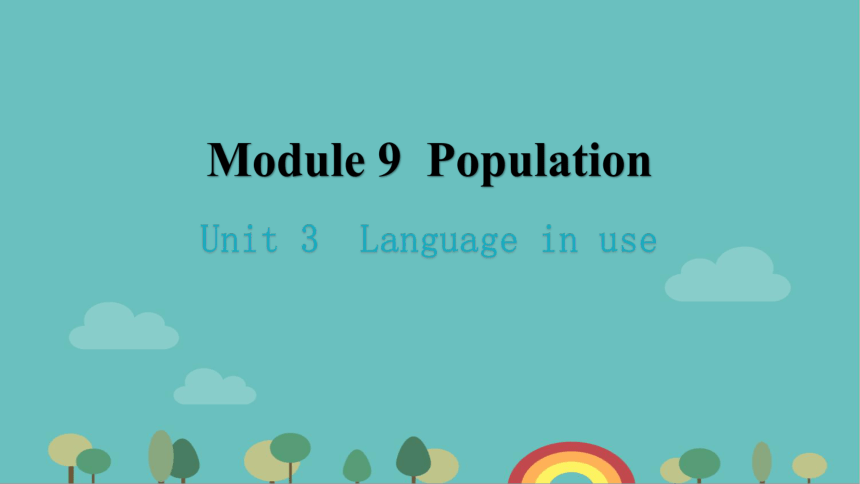 | |
| 格式 | pptx | ||
| 文件大小 | 255.1KB | ||
| 资源类型 | 教案 | ||
| 版本资源 | 外研版 | ||
| 科目 | 英语 | ||
| 更新时间 | 2022-10-08 09:14:05 | ||
图片预览



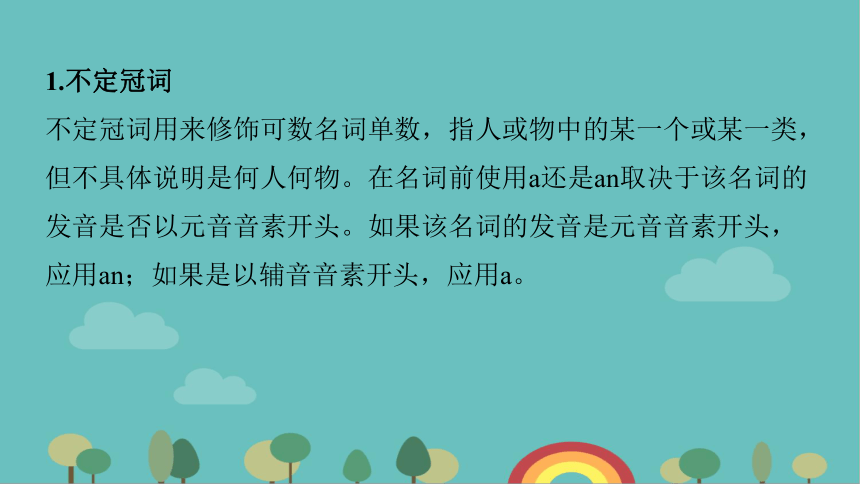


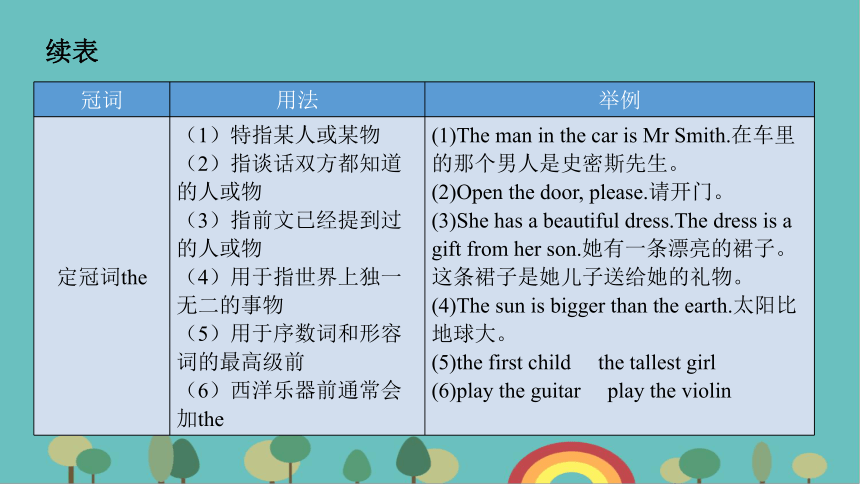
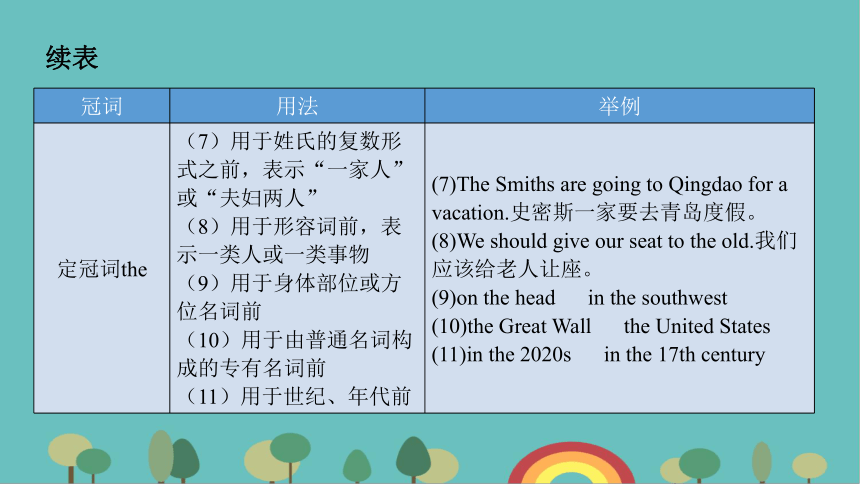



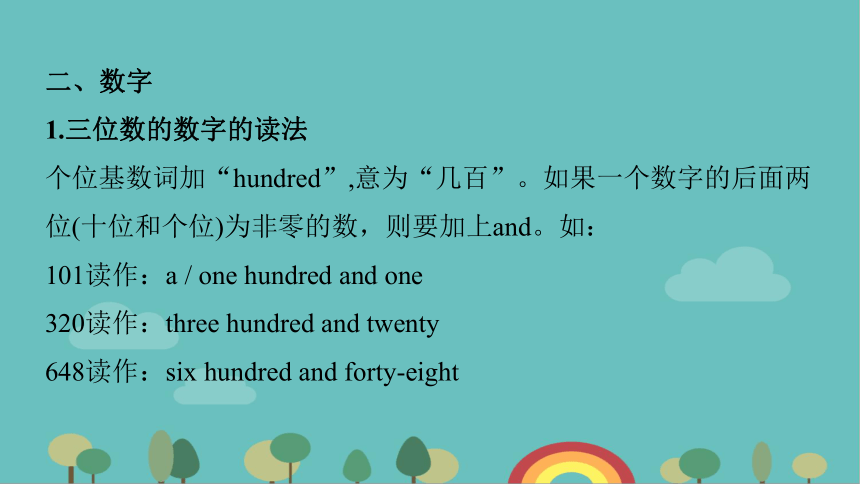
文档简介
(共33张PPT)
Module 9 Population
Unit 3 Language in use
目录
课堂小测
02
课后作业
03
语法聚焦
01
语法聚焦
冠词和数词
一、冠词
冠词是限定词的一种,不能单独使用,常用于修饰名词。冠词有三种形式:不定冠词a / an,定冠词the和零冠词(即不使用冠词)。
1.不定冠词
不定冠词用来修饰可数名词单数,指人或物中的某一个或某一类,但不具体说明是何人何物。在名词前使用a还是an取决于该名词的发音是否以元音音素开头。如果该名词的发音是元音音素开头,应用an;如果是以辅音音素开头,应用a。
2.定冠词
the是定冠词,在以辅音音素开头的单词前读 ,在以元音音素开头的单词前读 。可数名词的单数、复数及不可数名词前均可使用定冠词。
3.冠词的用法归纳
冠词 用法 举例
不定冠词a / an (1)泛指某一类人或事物 (2)用于首次提到某人或某物 (3)用于表示数量“一” (4)表示“每一”,相当于every, one (5)用于序数词前,表示“又一” (1)A panda is very lovely.熊猫非常可爱。
(2)I have a book.It is about history.我有一本书。它是关于历史的。
(3)I have a mouth and two eyes.我有一张嘴巴和两个眼睛。
(4)I go hiking once a month.我每个月去远足一次。
(5)I failed three times, but I’ll have a fourth try.我虽然失败了三次,但还会再试第四次。
续表
冠词 用法 举例
定冠词the (1)特指某人或某物 (2)指谈话双方都知道的人或物 (3)指前文已经提到过的人或物 (4)用于指世界上独一无二的事物 (5)用于序数词和形容词的最高级前 (6)西洋乐器前通常会加the (1)The man in the car is Mr Smith.在车里的那个男人是史密斯先生。
(2)Open the door, please.请开门。
(3)She has a beautiful dress.The dress is a gift from her son.她有一条漂亮的裙子。这条裙子是她儿子送给她的礼物。
(4)The sun is bigger than the earth.太阳比地球大。
(5)the first child the tallest girl
(6)play the guitar play the violin
续表
冠词 用法 举例
定冠词the (7)用于姓氏的复数形式之前,表示“一家人”或“夫妇两人” (8)用于形容词前,表示一类人或一类事物 (9)用于身体部位或方位名词前 (10)用于由普通名词构成的专有名词前 (11)用于世纪、年代前 (7)The Smiths are going to Qingdao for a vacation.史密斯一家要去青岛度假。
(8)We should give our seat to the old.我们应该给老人让座。
(9)on the head in the southwest
(10)the Great Wall the United States
(11)in the 2020s in the 17th century
续表
冠词 用法 举例
零冠词 (1)指示代词前不用冠词 (2)形容词性物主代词前不用冠词 (3)名词所有格前不用冠词 (4)在some, any, no, every等限定词前不用冠词 (5)表示语言、科目、三餐、球类、棋类的名词前不用冠词 (1)this car those apples
(2)his desk her schoolbag
(3)my brother’s cat LiLy’s dress
(4)some people any other country no photo every person
(5)in English learn geography have breakfast play football play chess
(6)on Sunday in February in autumn on Teachers’ Day
续表
冠词 用法 举例
零冠词 (6)表示星期、月份、季节、节日(中国传统节日除外)的名词前不用冠词 (7)表示人名、官衔、称呼、国名、地名的名词前不用冠词 (8)“by+交通工具”中间不用冠词 (7)Jack Professor Wang Uncle Paul China Guangzhou
(8)by bus by air
【注意】在某些词组中,名词前用冠词与不用冠词的意义有所不同。如:
in front of 在(范围外)的前面 in the front of 在(范围内)的前面
in hospital 住院 in the hospital在医院里
go to hospital去看病 go to the hospital去医院
at school在上学 at the school在学校里
in class在上课 in the class在班级里
at table 在进餐 at the table在桌子旁
二、数字
1.三位数的数字的读法
个位基数词加“hundred”,意为“几百”。如果一个数字的后面两位(十位和个位)为非零的数,则要加上and。如:
101读作:a / one hundred and one
320读作:three hundred and twenty
648读作:six hundred and forty-eight
2.四位数以上的数字的读法
从数字的右端向左端数起,每三位数看作一个单位,并加一个千位分隔符“,”。从右边开始,第一个“,”前的数字后添加thousand;第二个“,”前的数字后添加million;第三个“,”前的数字后添加billion。读数时,从左往右读,每个单位里的数字按照百、十、个位往后读,遵循百位以内数字的读法。如:
2,648读作:two thousand, six hundred and forty-eight
16,250,064读作:sixteen million, two hundred and fifty thousand, sixty-four
5,237,166,234读作:five billion, two hundred and thirty-seven million, one hundred and sixty-six thousand, two hundred and thirty-four
(3)分数修饰的名词在句子中作主语时,谓语动词的单复数
由名词决定。如:
Only one fifth of air consists of oxygen.氧气只占空气的五分
之一。
About two thirds of the students are going to attend the meeting.
大约三分之二的学生都将参加会议。
一、单项填空
( )1.I have got _____ unusual experience and I’ll never forget it.
A.a B.an C.the D./
( )2.Mina is _____ eighteen-year-old girl.I met her for _____ first time yesterday.
A.a; / B.an; the C.an; / D.a; the
专练
B
B
( )3.This morning I saw _____ accident on my way to school.Two men were badly hurt in _____accident.
A.an; an B.an; the C.the; an D.the; the
( )4.The teacher said that _____ of the boys would take part in the talent show.
A.three five B.three fives C.thirds fifths D.three fifths
B
D
( )5.Qomolangma is the highest mountain in the world.It is over eight _____ meters high.
A.thousands of B.thousand of
C.thousands D.thousand
D
二、找出下列句子的错误,并在横线上进行更正
6.He has donated thousand of dollars to charities.
______________________________
7.Zhong Nanshan is a example to us all.
______________________________
8.Three fourths of the boys in our class likes basketball.
______________________________
thousand改为thousands
a改为an
likes改为like
9.Mrs Li’s job is to take care of an one-year-old baby.
__________________________
10.Most of us have the dinner at about 6 pm.
__________________________
an改为a
把the去掉
课堂小测
一、根据句意及首字母或汉语提示填单词(注意使用正确形式)
1.Wide reading will i____________ your vocabulary.
2.We should make a r____________ to the head teacher before we do it.
3.You must give up smoking.It can ____________ (引起)some serious illnesses.
ncrease
eport
cause
4.How q____________ this evening is! I think you must sleep well.
5.We would like to try some ____________ (当地的) food when we go to a new place.
uiet
local
二、用a,an,the或/填空
6.—Do you know ____________ girl over there
—Yes, she likes playing ____________ basketball a lot.
7.It’s time for____________ breakfast.
8.Chinese people usually eat zongzi on ____________ Dragon Boat Festival.
the
/
/
the
9.We all know ____________ earth goes round _________ sun.
10.I think English is ____________ useful language, and it’s also ____________ important language.
the
the
a
an
三、语法选择
Do you know _11_ people there were in the world 200 years ago Just one billion._12_ only 100 years later, the population was increased by 100 percent.In 1971, about 3.5 _13_ people lived on the earth.Forty years later, the number doubled(翻倍)._14_ 31st October, 2001, the 7 billionth world citizen(公民), _15_ baby girl was born in the Philippines(菲律宾).At this speed, it will shoot up to 8 billion by the year 2025.
Most new _16_ were born in developing countries.Most families have four or five children.In many developed countries, the population is increasing _17_.Most families have only one or two babies.
In many developing countries, people are short of food, water and medicine.What’s worse, farmland _18_ less and less.Farmers are moving to cities to make a living.But cities can’t
satisfy(满足) _19_ needs at all.Finally, many people can’t find jobs, and they become poorer and poorer.
_20_ these problems, many developing countries are taking measures to control the population.
( )11.A.how often B.how much C.how many
( )12.A.But B.And C.Because
( )13.A.billions of B.billion C.billions
( )14.A.In B.At C.On
( )15.A.the B.a C.an
C
A
B
C
B
( )16.A.babies B.baby C.baby’s
( )17.A.slow B.slowly C.slowness
( )18.A.become B.is becoming C.becomes
( )19.A.they B.them C.their
( )20.A.To solve B.Solve C.Solving
A
B
B
C
A
课后作业
此部分习题详见独立装订的《分层作业本》。请同学们完成Module 9 Unit 3的练习题。
THANKS!
Module 9 Population
Unit 3 Language in use
目录
课堂小测
02
课后作业
03
语法聚焦
01
语法聚焦
冠词和数词
一、冠词
冠词是限定词的一种,不能单独使用,常用于修饰名词。冠词有三种形式:不定冠词a / an,定冠词the和零冠词(即不使用冠词)。
1.不定冠词
不定冠词用来修饰可数名词单数,指人或物中的某一个或某一类,但不具体说明是何人何物。在名词前使用a还是an取决于该名词的发音是否以元音音素开头。如果该名词的发音是元音音素开头,应用an;如果是以辅音音素开头,应用a。
2.定冠词
the是定冠词,在以辅音音素开头的单词前读 ,在以元音音素开头的单词前读 。可数名词的单数、复数及不可数名词前均可使用定冠词。
3.冠词的用法归纳
冠词 用法 举例
不定冠词a / an (1)泛指某一类人或事物 (2)用于首次提到某人或某物 (3)用于表示数量“一” (4)表示“每一”,相当于every, one (5)用于序数词前,表示“又一” (1)A panda is very lovely.熊猫非常可爱。
(2)I have a book.It is about history.我有一本书。它是关于历史的。
(3)I have a mouth and two eyes.我有一张嘴巴和两个眼睛。
(4)I go hiking once a month.我每个月去远足一次。
(5)I failed three times, but I’ll have a fourth try.我虽然失败了三次,但还会再试第四次。
续表
冠词 用法 举例
定冠词the (1)特指某人或某物 (2)指谈话双方都知道的人或物 (3)指前文已经提到过的人或物 (4)用于指世界上独一无二的事物 (5)用于序数词和形容词的最高级前 (6)西洋乐器前通常会加the (1)The man in the car is Mr Smith.在车里的那个男人是史密斯先生。
(2)Open the door, please.请开门。
(3)She has a beautiful dress.The dress is a gift from her son.她有一条漂亮的裙子。这条裙子是她儿子送给她的礼物。
(4)The sun is bigger than the earth.太阳比地球大。
(5)the first child the tallest girl
(6)play the guitar play the violin
续表
冠词 用法 举例
定冠词the (7)用于姓氏的复数形式之前,表示“一家人”或“夫妇两人” (8)用于形容词前,表示一类人或一类事物 (9)用于身体部位或方位名词前 (10)用于由普通名词构成的专有名词前 (11)用于世纪、年代前 (7)The Smiths are going to Qingdao for a vacation.史密斯一家要去青岛度假。
(8)We should give our seat to the old.我们应该给老人让座。
(9)on the head in the southwest
(10)the Great Wall the United States
(11)in the 2020s in the 17th century
续表
冠词 用法 举例
零冠词 (1)指示代词前不用冠词 (2)形容词性物主代词前不用冠词 (3)名词所有格前不用冠词 (4)在some, any, no, every等限定词前不用冠词 (5)表示语言、科目、三餐、球类、棋类的名词前不用冠词 (1)this car those apples
(2)his desk her schoolbag
(3)my brother’s cat LiLy’s dress
(4)some people any other country no photo every person
(5)in English learn geography have breakfast play football play chess
(6)on Sunday in February in autumn on Teachers’ Day
续表
冠词 用法 举例
零冠词 (6)表示星期、月份、季节、节日(中国传统节日除外)的名词前不用冠词 (7)表示人名、官衔、称呼、国名、地名的名词前不用冠词 (8)“by+交通工具”中间不用冠词 (7)Jack Professor Wang Uncle Paul China Guangzhou
(8)by bus by air
【注意】在某些词组中,名词前用冠词与不用冠词的意义有所不同。如:
in front of 在(范围外)的前面 in the front of 在(范围内)的前面
in hospital 住院 in the hospital在医院里
go to hospital去看病 go to the hospital去医院
at school在上学 at the school在学校里
in class在上课 in the class在班级里
at table 在进餐 at the table在桌子旁
二、数字
1.三位数的数字的读法
个位基数词加“hundred”,意为“几百”。如果一个数字的后面两位(十位和个位)为非零的数,则要加上and。如:
101读作:a / one hundred and one
320读作:three hundred and twenty
648读作:six hundred and forty-eight
2.四位数以上的数字的读法
从数字的右端向左端数起,每三位数看作一个单位,并加一个千位分隔符“,”。从右边开始,第一个“,”前的数字后添加thousand;第二个“,”前的数字后添加million;第三个“,”前的数字后添加billion。读数时,从左往右读,每个单位里的数字按照百、十、个位往后读,遵循百位以内数字的读法。如:
2,648读作:two thousand, six hundred and forty-eight
16,250,064读作:sixteen million, two hundred and fifty thousand, sixty-four
5,237,166,234读作:five billion, two hundred and thirty-seven million, one hundred and sixty-six thousand, two hundred and thirty-four
(3)分数修饰的名词在句子中作主语时,谓语动词的单复数
由名词决定。如:
Only one fifth of air consists of oxygen.氧气只占空气的五分
之一。
About two thirds of the students are going to attend the meeting.
大约三分之二的学生都将参加会议。
一、单项填空
( )1.I have got _____ unusual experience and I’ll never forget it.
A.a B.an C.the D./
( )2.Mina is _____ eighteen-year-old girl.I met her for _____ first time yesterday.
A.a; / B.an; the C.an; / D.a; the
专练
B
B
( )3.This morning I saw _____ accident on my way to school.Two men were badly hurt in _____accident.
A.an; an B.an; the C.the; an D.the; the
( )4.The teacher said that _____ of the boys would take part in the talent show.
A.three five B.three fives C.thirds fifths D.three fifths
B
D
( )5.Qomolangma is the highest mountain in the world.It is over eight _____ meters high.
A.thousands of B.thousand of
C.thousands D.thousand
D
二、找出下列句子的错误,并在横线上进行更正
6.He has donated thousand of dollars to charities.
______________________________
7.Zhong Nanshan is a example to us all.
______________________________
8.Three fourths of the boys in our class likes basketball.
______________________________
thousand改为thousands
a改为an
likes改为like
9.Mrs Li’s job is to take care of an one-year-old baby.
__________________________
10.Most of us have the dinner at about 6 pm.
__________________________
an改为a
把the去掉
课堂小测
一、根据句意及首字母或汉语提示填单词(注意使用正确形式)
1.Wide reading will i____________ your vocabulary.
2.We should make a r____________ to the head teacher before we do it.
3.You must give up smoking.It can ____________ (引起)some serious illnesses.
ncrease
eport
cause
4.How q____________ this evening is! I think you must sleep well.
5.We would like to try some ____________ (当地的) food when we go to a new place.
uiet
local
二、用a,an,the或/填空
6.—Do you know ____________ girl over there
—Yes, she likes playing ____________ basketball a lot.
7.It’s time for____________ breakfast.
8.Chinese people usually eat zongzi on ____________ Dragon Boat Festival.
the
/
/
the
9.We all know ____________ earth goes round _________ sun.
10.I think English is ____________ useful language, and it’s also ____________ important language.
the
the
a
an
三、语法选择
Do you know _11_ people there were in the world 200 years ago Just one billion._12_ only 100 years later, the population was increased by 100 percent.In 1971, about 3.5 _13_ people lived on the earth.Forty years later, the number doubled(翻倍)._14_ 31st October, 2001, the 7 billionth world citizen(公民), _15_ baby girl was born in the Philippines(菲律宾).At this speed, it will shoot up to 8 billion by the year 2025.
Most new _16_ were born in developing countries.Most families have four or five children.In many developed countries, the population is increasing _17_.Most families have only one or two babies.
In many developing countries, people are short of food, water and medicine.What’s worse, farmland _18_ less and less.Farmers are moving to cities to make a living.But cities can’t
satisfy(满足) _19_ needs at all.Finally, many people can’t find jobs, and they become poorer and poorer.
_20_ these problems, many developing countries are taking measures to control the population.
( )11.A.how often B.how much C.how many
( )12.A.But B.And C.Because
( )13.A.billions of B.billion C.billions
( )14.A.In B.At C.On
( )15.A.the B.a C.an
C
A
B
C
B
( )16.A.babies B.baby C.baby’s
( )17.A.slow B.slowly C.slowness
( )18.A.become B.is becoming C.becomes
( )19.A.they B.them C.their
( )20.A.To solve B.Solve C.Solving
A
B
B
C
A
课后作业
此部分习题详见独立装订的《分层作业本》。请同学们完成Module 9 Unit 3的练习题。
THANKS!
同课章节目录
- Module 1 How to learn English
- Unit 1 Let's try to speak English as much as possi
- Unit 2 You should smile at her.
- Unit 3 Language in use .
- Module 2 My home town and my country
- Unit 1 It's taller than many other buildings.
- Unit 2 Cambridge is a beautiful city in the east o
- Unit 3 Language in use .
- Module 3 Sports.
- Unit 1 Nothing is more exciting than playing tenni
- Unit 2 This year we training more carefully.
- Unit 3 Language in use .
- Module 4 Planes, ships and trains .
- Unit 1 He lives the farthest from school.
- Unit 2 What is the best way to travel.
- Unit 3 Language in use .
- Module 5 Lao She Teahouse.
- Unit 1 I wanted to see the Beijing Opera.
- Unit 2 It descibes the changes in Chinese society.
- Unit 3 Language in use .
- Module 6 Animals in danger.
- Unit 1 It allows people to get closer to them .
- Unit 2 The WWF is working hard to save them all.
- Unit 3 Language in use .
- Revision module A
- Module 7 A famous story
- Unit 1 Alice was sitting with her sister by the ri
- Unit 2 She was thinking about her cat.
- Unit 3 Language in use .
- Module 8 Accidents
- Unit 1 While the car were changing to red, a car s
- Unit 2 I was trying to pick it up when it bite me
- Unit 3 Language in use .
- Module 9 Population
- Unit 1 The population of China is about 1.37 billi
- Unit 2 Arnwick was a city with 200,000 people.
- Unit 3 Language in use .
- Module 10 The weathe
- Unit 1 It might snow.
- Unit 2 The weather is fine all year round.
- Unit 3 Language in use .
- Module 11 Way of life
- Unit 1 In China ,we open a gift later.
- Unit 2 In England, you usually drink tea with milk
- Unit 3 Language in use .
- Module 12 Help
- Unit 1 What should we do before help arrives?
- Unit 2 Stay away from windows and heavy furniture.
- Unit 3 Language in use .
- Revision module B
